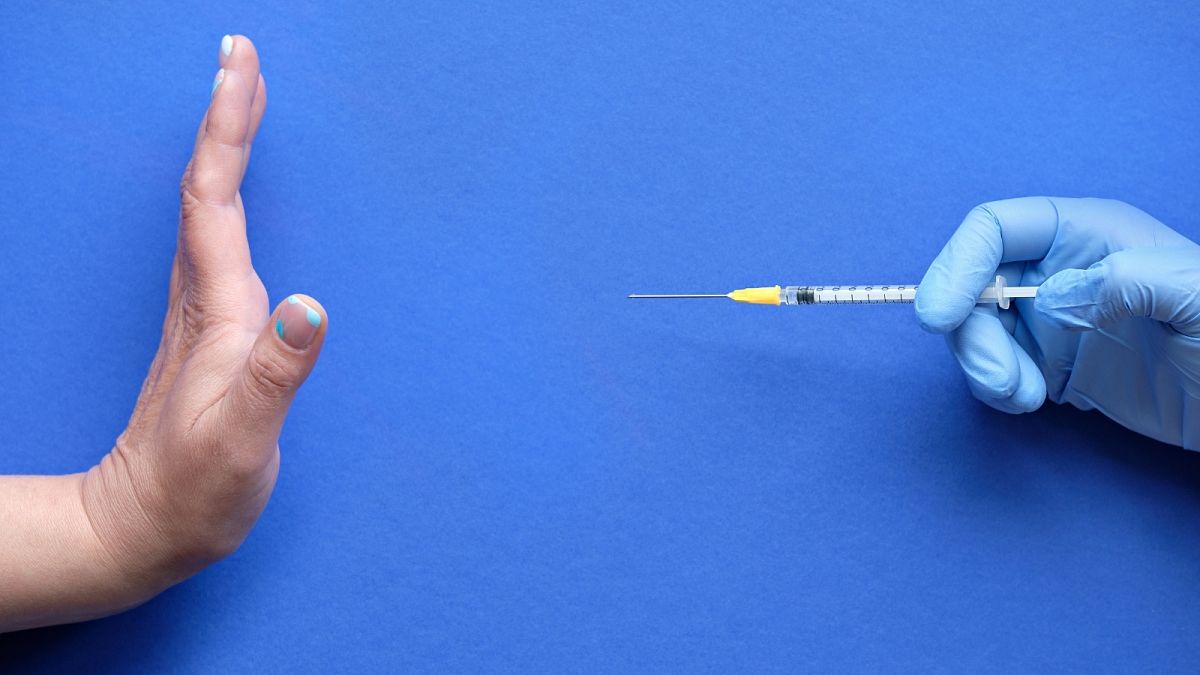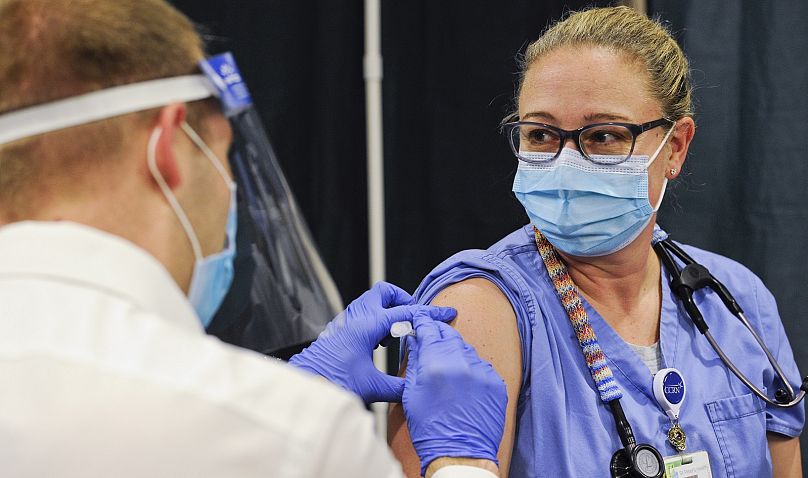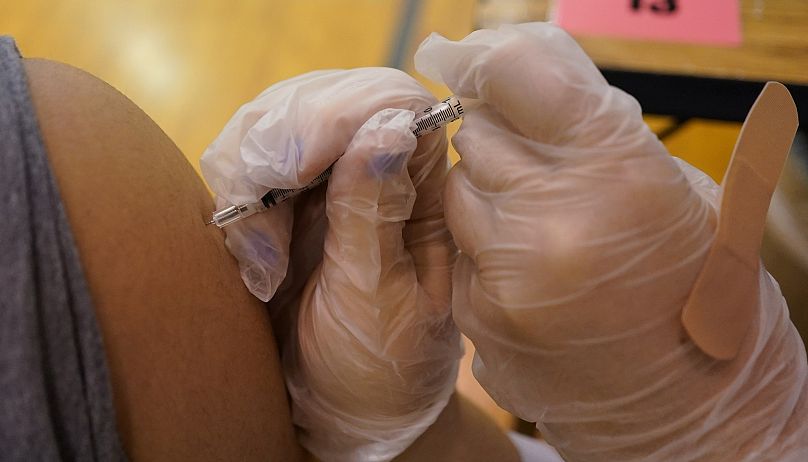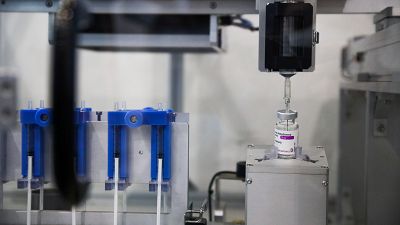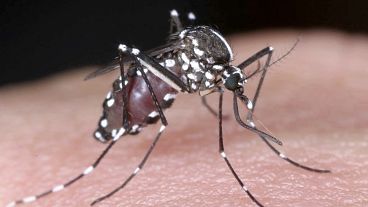Still concerned about getting a COVID vaccine? Euronews Next asked the experts for answers to your questions.
Over 4.8 billion vaccines doses have been administered around the world so far. In terms of human lives, that accounts for only 32 per cent of the world's population having at least one dose, according to the University of Oxford's latest data.
The latest efforts to fight COVID-19 are being squarely focused on the people who are not vaccinated -and they are having mixed results.
In countries like France, the government is forcing vaccination to health workers and requiring a COVID-19 free certificate to enter places such as restaurants and cinemas. In Germany, Head of the German Chancellery Helge Braun said vaccinated people will "have more freedoms than unvaccinated people".
In the US, President Joe Biden is pushing cash rewards for those who get vaccinated.
Anti-vaxxers vs people with genuine concerns
Despite all efforts, millions have still to take the shot in places where they are free and available. Those who remain hesitant to take the jab have fallen into two main categories: the group who is completely opposed to the idea, and those who understand the need for a COVID-19 vaccine but have safety concerns.
Health care professionals have raised concerns about treating the unvaccinated as a group of defectors, and of putting them all under the banner of anti-vaxxers.
Euronews gathered the questions from our audience which reflect some of the most pressing concerns of those still hesitant about having the vaccine. Their concerns are well sustained, logical, and fair.
We posed these questions to Professor Neil Mabbott, Chair of immunopathology at the University of Edinburgh Roslin Institute and Royal (Dick) School of Veterinary Sciences. His research focuses on immune responses to infectious diseases and how ageing affects the function of our immune systems.
As a supplementary resource, we also referenced the COVID-19 Vaccine Communication Handbook from the University of Bristol, where a team of renowned scientific experts offers the latest information about vaccines.
***
Euronews:The most common question among our readers concerned the long-term side effects of the vaccines. One reader brought up the study that suggests that the Hepatitis B vaccine increases the risk of developing multiple sclerosis (MS). How do we make sure it won't be the same for the COVID-19 vaccine in the long-term?
Prof. Mabbott: Yes, a very, very good question. People should be reassured that the regulatory agencies in each country have taken a very careful look at reports of side effects be they mild or serious, and looking for these kinds of serious signals.
To date, the vast majority of the data across the world is showing that side effects tend to be very mild and very transient, lasting only a day or so. The typical ones being a sore arm and then flu-like symptoms which persist maybe a day or two thirds in the most robust majority.
Very rare incidence of serious side effects has been detected. And still, in many cases, it is uncertain whether these are absolutely a cause of the vaccine, or whether it is some circumstantial effect. But these are still extremely, extremely rare. COVID-19 vaccines have proven to be very safe.
COVID-19 Vaccine Communication Handbook: The European Medicines Agency released its first safety update about the Pfizer/BioNTech vaccine on January 29, 2021. It concludes that safety data collected on Comirnaty use in vaccination campaigns are consistent with the known safety profile of the vaccine, and no new side effects were identified.
Euronews:What about the long-term side effects? The kind that would take years to detect?
Prof. Mabbott: For the very long-term side effects, it would be very, very difficult to be able to track that back to the vaccine, wouldn't it? If it is something that happened a year after vaccination it makes it very difficult to say with certainty that that was due to vaccination or circumstantial and due to other factors.
But as I have been pointing out, because we've been delivering these vaccines to millions of people - actually billions of doses that have been administered around the world - gives us a very good picture of the side effects which these vaccines do or don't cause.
It has spotted, for example, the potential side effect of the clotting, although rare with the AstraZeneca vaccine. We've been able to look back at the data and revise how we administer those vaccines giving them to certain populations etc.
COVID-19 Vaccine Communication Handbook: And given the known risk that COVID-19 can cause long-term damage, the risk of long-term side effects from the vaccines is likely to be far smaller.
***
Euronews:What about the risk of having a thrombosis? How likely is that?
COVID-19 Vaccine Communication Handbook: There now appears to be a link between blood clot events and Oxford/AstraZeneca vaccination, but these side effects appear to be very rare.
There is a higher risk you will suffer thrombosis from Covid-19 than from vaccination. The relative risk of a blood clot in the brain (known as CVT - central vein thrombosis) is about 6-10 times higher from Covid-19 than from an mRNA vaccine like Pfizer. For a blood clot in the liver (known as PVT - portal vein thrombosis), the risk is 7-14 times higher from COVID than from the vaccine.
Euronews:Will COVID-19 vaccines have an impact on your fertility?
COVID-19 Vaccine Communication Handbook:The guidance published by the Association of Reproductive and Clinical Scientists (ARCS) and the British Fertility Society confirms that there is absolutely no evidence, and no theoretical reason, that any of the vaccines can affect the fertility of women or men.
***
Euronews: Will receiving an mRNA vaccine alter my DNA?
COVID-19 Vaccine Communication Handbook: MRNA stands for messenger ribonucleic acid and can be most easily described as instructions to your cells for how to make a protein or even just a piece of a protein. MRNA is not able to alter or modify a person’s genetic makeup (DNA). The mRNA from a COVID-19 vaccine never enters the nucleus of the cell, which is where our DNA is kept. This means the mRNA does not affect or interact with our DNA in any way.
Instead, COVID-19 vaccines that use mRNA work with the body’s natural defenses to safely develop protection (immunity) to disease.
Learn more at the CDC website.
Euronews:That leads us to the second most pressing concern. How is it that vaccines were made so fast?
Prof. Mabbott: It's a very good question. What people have to appreciate is that although the vaccine was, I guess, manufactured very quickly, actually, these vaccines have been researched and in design for many years, at least 10 years for the AstraZeneca vaccine, for example.
They had already designed the adenovirus format, which they could use later for delivering as a vaccine. And in fact, they were able to seize the opportunity when the current virus epidemic arose to repurpose that vaccine, redesign that vaccine to use against the coronavirus.
So these vaccines weren't made overnight. There's been lots of thorough research that's gone into this.
Another thing that we have learned during the coronavirus epidemics is that we can streamline this process of testing and approval to make it more efficient. But rest assured, no corners were cut. All these vaccines have gone through the standard phase one, two, and three safety and efficacy trials.
***
Euronews:How effective is the coronavirus vaccine compared historically to other previous vaccines?
Prof. Mabbott: Initially, we thought maybe 50, 60 per cent would be good protection against serious disease and death if we were lucky.
If you want to stop the disease completely, then you need a vaccine that is 100 per cent effective and there are no vaccines available on the planet which have that level of efficacy.
All the main vaccines which we use at the moment - the Pfizer, the Moderna and the AstraZeneca vaccines - are providing very high protection around the 98 per cent level against serious disease, hospitalisation, and death.
Of course, there are issues with the rise of the different variants, particularly the Delta variant, where vaccinated people still appear to be able to be affected. But in most of those people, the disease is much, much milder. And very very few people who are fully vaccinated end up in hospital with a serious disease and ultimately dying.
Euronews:What exactly does vaccine efficacy mean? Does it actually prevent you from getting sick or does it mean that it prevents you from catching the virus?
Prof. Mabbott: The coronavirus vaccines were tested against protection, against serious illness, hospitalisation, and death. So that's what we mean here by efficacy.
Euronews: Right, so it does not necessarily mean that you won't catch the virus; it means that they are meant to prevent serious illness?
Yes, exactly. As I pointed out, certainly against the Delta virus, some double vaccinated or fully vaccinated people have still gotten sick with coronavirus, but the vast majority of those people have experienced mild disease if any. And that obviously contrasts against those that haven't been vaccinated where many would perhaps end up in hospital after a serious disease.
***
Euronews:Can you spread the virus when you are vaccinated?
Prof. Mabbott: There's some circumstantial evidence to suggest that might be true. It depends on the variance of coronavirus.
If you've been infected with some of the other earlier variants, perhaps not. There was a survey in the UK suggesting that vaccines were preventing around 40 per cent transmission of the Alpha variant into all vaccinated people.
So, whether that's true or not for the Delta variant, we don't know, because it’s much more aggressive. So, it may be the case that all vaccinated people can perhaps still pass on the virus to other people. But of course, if they're fully vaccinated, they may not experience a serious disease.
Euronews:Some people think it's not worth getting the vaccine because there’s a chance they will spread the virus anyway. What do you think of that?
Prof. Mabbott: Vaccines are still providing, despite this possibility, very good protection against transmission. And again, the vaccines are holding up very well at preventing serious illnesses, hospitalisations, and deaths.
For example, we still got quite a high burden of the virus in the UK but the numbers of hospitalisations, serious illnesses and deaths are much much lower. The vast majority of the deaths and the serious illnesses and hospitalisations we are seeing in the UK are people who haven't been vaccinated.
So if people want to stop themselves from ending up in the hospital and getting serious illness and dying from coronavirus, I would strongly recommend that they get the vaccine.
***
Euronews:Would you experience an asymptomatic infection if you catch the virus after being fully vaccinated?
Prof. Mabbott: Yes, you would potentially have an asymptomatic infection. And certainly, very mild symptoms if you show any because you've been vaccinated and have protective immunity.
Euronews: Several people in our polls said they were bothered by the fact that they would need to get a booster vaccine every year.
Prof. Mabbott: Yes, that's an interesting question. It is still not conclusive as to whether or not booster vaccines will be needed. I know in the UK, they're seriously considering the possibility now of implementing booster vaccines for the high-risk individuals, perhaps for those with weakened immune systems and immunosuppression - perhaps cancer patients which have had chemotherapy, transplant patients etc. Those may have responded quite poorly the first time round to their vaccines.
Otherwise, for most cases, I don't think that there's a strong need for booster vaccines. But we will, of course, be monitoring all that.
Euronews:OK, so what if there's a new variant that arises which can escape the immunity developed by the vaccines?
Prof. Mabbott: Well, then it may be the case that in a year or so time or whenever, we will perhaps need to provide some kind of proper vaccine to train the immune system to recognise new and emerging virus strains. But the vaccines that we're currently using are both ideally suited for rapid repurposing, for redesigning to address the apparent appearance of variants.
There are some vaccines that can provide lifelong protection. We have one shot perhaps as a child, and we don't need to have it for the rest of our lives.
Certainly, for example, such as tetanus shot in the UK, we used to have that once every 10 years or so. So, it really depends on the pathogen or the infection and the type of virus, such as whether we need this and we just don't know at this stage for that for the coronavirus vaccines. But of course, time will tell.
***
Euronews:Another argument amongst the people who are hesitant about taking the vaccine is that even if you are double vaccinated, you might not develop antibodies.
Prof. Mabbott: I wouldn't say there'd be a large percentage of people that don’t make antibodies. This will come back to people who have weakened immune systems for various reasons. The most obvious would be those immunosuppressed. Perhaps they're receiving some immunosuppressant drugs because the transplant patients, maybe they're undergoing chemotherapy. They may have infections such as HIV, perhaps the very elderly.
As we get older, our immune systems become less efficient and less responsive to vaccines. So there will be certain circumstances where immune responses are much weaker to the vaccines. But that is not going to be true for the vast majority of the population, which will generally make a pretty strong antibody response to the vaccines.
***
Euronews:What is the difference between breakthrough infection and breakthrough disease?
Prof. Mabbott: They're reasonably similar phrases for the same thing, a breakthrough infection would be where you have a vaccinated population and despite that, another strain has arisen which is able to circumvent or escape that immunity within that population. I guess then would be causing what was called then a breakthrough disease, because these people don't experience clinical signs of Covid 19.
Euronews:People seem to be suspicious about that. Several readers asked why are the numbers rising so quickly amongst vaccinated people?
Prof. Mabbott: I'm not sure the numbers are necessarily rising particularly high amongst the vaccinated people.
In the U.K, we've got a much higher proportion now of our population that has been vaccinated, I think 89 per cent now of the population of the UK adults. So, it's 89 per cent of UK adults have had their first vaccine dose or at least their first vaccine dose. So because such a high proportion of the population have now been vaccinated, it's by chance we're going to see obviously more cases among the vaccinated because there are so few adults now in the UK that haven't been vaccinated. So I'm not sure we're seeing significant signs of the virus breaking through the vaccination. But because you have so many people vaccinated, we are obviously going to detect now more cases in vaccinated.
Euronews:Right, so it's a counterintuitive statistic?
Prof. Mabbott: Exactly. It sounds quite alarming, doesn't it? It's the kind of statistical issue. And again, those infections are much, much milder than they have been in the past.
Vaccines are able to reduce the severity of that infection. They are acting as barriers to prevent that infection from becoming much, much more severe.
***
Euronews: Another important question: Does the fact that vaccinated people are getting sick mean that vaccines aren't working?
Prof. Mabbott: No, absolutely not. Vaccines are working beautifully and just how we hoped they would do. Remember, they were originally tested against the prevention of serious illness, hospitalisation and death. And they're still holding up pretty well against that.
Euronews:Could you please explain why are we still being asked to wear masks after vaccination?
Prof. Mabbott: The vaccines are protecting the recipients of that vaccine against serious illness, hospitalisation and death. But they may be at least still able to pass on the disease to somebody who's not vaccinated or those who had a poor response to the vaccines. And of course, that may then cause serious illness in that recipient.
And we know that the masks and all the other kinds of measures have been working, as we saw how effective they were at reducing the number of cases around the world before we had the vaccines available.
